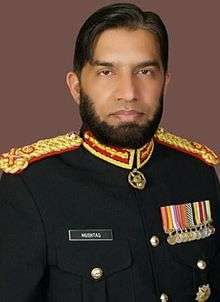Mushtaq Ahmed Baig
| Mushtaq Ahmed Baig | |
|---|---|
 Lieutenant-General Mushtaq Ahmed Baig (in a dress uniform), PA. | |
| Birth name | Mushtaq Ahmed Baig |
| Born |
December 21,1951 Lehr Sultanpur village, district Chakwal, Punjab province. |
| Died |
February 25, 2008 (57 years old) Rawalpindi, Punjab province. |
| Allegiance |
|
| Service/branch |
|
| Years of service | 1976–2008 |
| Rank |
|
| Unit | Pakistan Army Medical Corps |
| Commands held |
Surgeon General Pakistan Army Medical Corps Director General medical services [Commandant] Army Medical College |
| Battles/wars |
Indo-Pakistani War of 1999 Indo-Pakistani Standoff (2001) War in North-West Pakistan Battle of Swat |
| Awards | Hilal-i-Imtiaz (military) |
Lieutenant-General Mushtaq Ahmad Baig HI(M) (1951 – 25 February 2008) was the surgeon general of the Pakistani Army until his death from a suicide-bomb attack on Feb. 25, 2008. He was an ophthalmologist by profession. Baig is the oldest senior Army officer to be targeted and killed since Pakistan's involvement in the War on Terror and the North West-Pakistan Conflict.[1]
Early life
Baig was born in Lehr Sultanpur Village, Chakwal District, in 1951 to a middle-class family. He graduated from King Edward Medical University (KEMU)[2] with a Bachelor of Medicine and Bachelor of Surgery (BMBS) in 1974. Two years later, Baig was granted a military commission, and was subsequently inducted into the Army Medical Corps. Baig completed his Master of Surgery (M.S.) degree and received a Doctorate of Ophthalmology from the Army Medical College (AMC).[3]
After joining the Pakistan Army, Baig quickly climbed in rank as he excelled at various assignments. In 2003 he was promoted to major general, and made commandant of Army Medical College Rawalpindi (AMCR).[4] Baig is credited for implementing revolutionary changes in the medical services in the Pakistani Armed Forces (PAF), as well as improvements for both Air Force and Navy medical services.[5] In 2006, Baig was awarded the second-highest military award, the Hilal-i-Imtiaz–Military. That same year, he was promoted to Lieutenant General. In 2007, he was made the surgeon general of the Pakistani Army and was promoted to colonel commandant of the Army Medical Corps.
Assassination
On Monday, February 25, 2008, General Baig's vehicle was targeted by a suicide bomber. The suicide bomber, suspected to be linked to Al-Qaeda or the Taliban, struck when Baig's car was stopped at a traffic light on a busy road in Rawalpindi. The attack killed General Baig,[6] the suicide bomber, and eight civilians, leaving twelve wounded.[7]
The assassination occurred a week after Pakistan had held peaceful parliamentary elections. Following the attack, an emergency was declared in the city of Rawalpindi, with civilian and military hospitals being put on high alert. Pakistani authorities stated that General Baig was the highest-ranking army officer to be killed in line of duty since Pakistan became a member of the anti-terror coalition in 2001.[8]
Aftermath
President Parvez Musharraf and care-taker Prime Minister Muhammad Mian Soomro strongly condemned the attack. Musharraf and Soomro said such heinous acts of violence cannot deter the government from its resolve in its fight against terrorism. President Musharraf spoke highly of Baig and described him as an exceptional officer of high caliber who showed a remarkable commitment to serving humanity.[9]
References
- ↑ Buncombe, Andrew (26 February 2008). "Suicide bomber kills general in Pakistan". The Independent- Asia Correspondent. Islamabad, Pakistan.
- ↑ "Lieutenant-General Mushtaq Ahmad Baig".
- ↑ (ISPR), Inter Services Public Relations. "Lieutenant-General Mushtaq Ahmad Baig - Dated: February 25, 2008".
- ↑ Federal Bureau (2008). "Rawalpindi Suicide Blast: Kills 8 with Pakistan Army Surgeon General". Pakistan Times. Rawalpindi, Punjab province: Mumtaz Hamid Rao.
- ↑ "COAS/ CJCSC condemn suicide attack on Surgeon General Mushtaq Ahmad Baig". The Express Tribune.
- ↑ Gul, Ayaz (25 February 2008). "Suicide Bomb Kills Eight in Pakistan". Global Security. Ayaz Gul.
- ↑ "Death of Surgeon General Lieutenant-General Mushtaq Ahmed Baig". pakistan: The Express Tribune. Archived from the original on 2011-01-22.
- ↑ Pike, John. "Suicide Bomb Kills Eight in Pakistan". www.globalsecurity.org. Retrieved 2016-11-17.
- ↑ "COAS/ CJCSC condemn suicide attack on Surgeon General Mushtaq Ahmad Baig".
External links
- Pakistan army's top medic killed
- Wikinews on Lieutenant-General Mushtaq Ahmad Baig